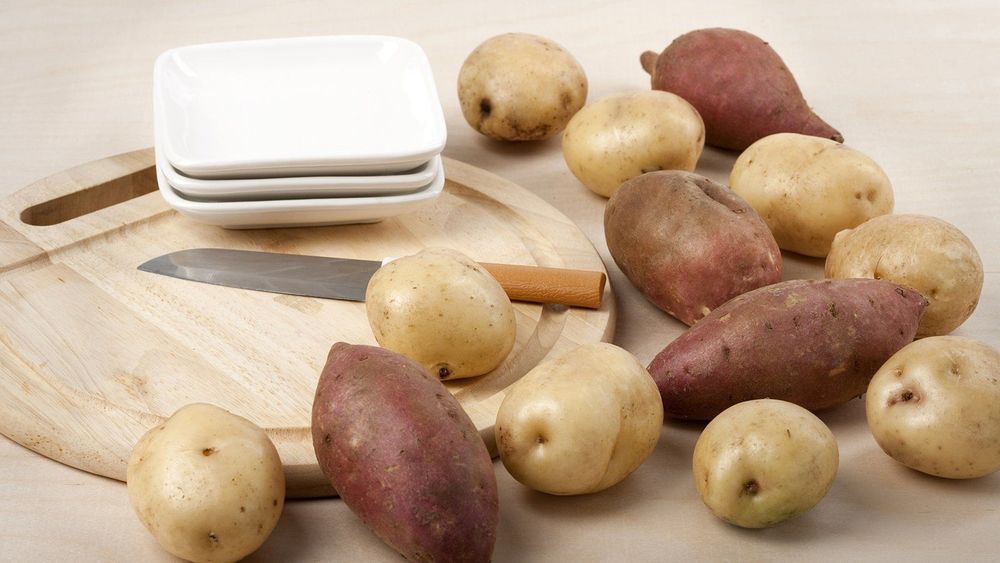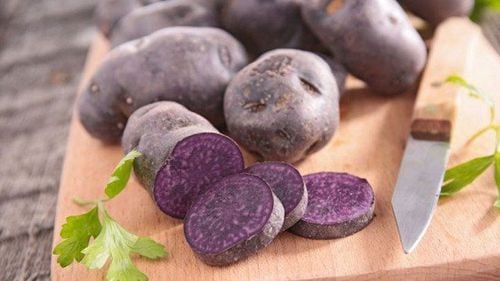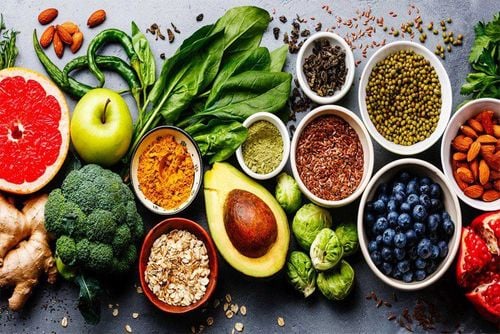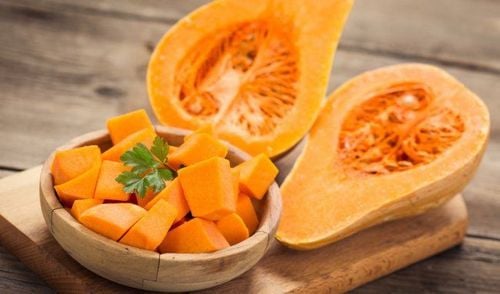This is an automatically translated article.
Sweet potatoes and potatoes are both root vegetables, but they have differences in appearance and taste. These two types of potatoes come from separate plant families, provide different nutrients and affect the body's blood sugar differently.
1. Sweet potatoes and potatoes are different plant families
Sweet potatoes and potatoes are both considered as root vegetables, but only related to each other. Sweet potatoes belong to the family Convolvulaceae, and white potatoes belong to the family Solanaceae. The edible part of these plants is the root part. Both varieties are native to parts of Central and South America but are now eaten all over the world.
Sweet potatoes usually have brown skin and orange flesh, but purple, yellow and red varieties are also available. Common potatoes come in brown, yellow, and red colors and have white or yellow flesh.
In the United States and some other countries, sweet potatoes are commonly referred to as yams, even though they are of different species.
2. Both potatoes and sweet potatoes are nutritious
Sweet potatoes are often known as healthier foods than white potatoes, but in fact, both types have high nutritional value.
Below is a nutritional comparison of 100g of white sweet potato and corresponding sweet potato skin.
White potatoes
Calories 92 Protein 2 grams Fat 0.15 grams Carbs 21 grams Fiber 2.1 grams Vitamin A 0.1% daily value (DV) Vitamin B6 12% DV Vitamin C 14% DV Potassium 17% DV Calcium 1% DV Magnesium 6% DV Sweet potatoes
Calories 90 Protein 2 grams Fat 0.15 grams Carbs 21 grams Fiber 3.3 grams Vitamin A 107% Daily Value (DV) Vitamin B6 17% DV Vitamin C 22% DV Potassium 10% DV Calcium 3% DV Magnesium 6% DV Although sweet potatoes contain similar amounts of calories, protein, and carbs, white potatoes provide more potassium, while sweet potatoes do not. high in vitamin A. Both sweet potatoes and potatoes contain other beneficial plant compounds.
Sweet potatoes, including the red and purple varieties, are rich in antioxidants that help fight cell damage in the body caused by free radicals.
Common potatoes contain compounds called glycoalkaloids, which have been shown to have anti-cancer and other beneficial effects in test-tube studies.
Both types of potatoes are rich in fiber, carbs and vitamins B6 and C. White potatoes contain higher levels of potassium than sweet potatoes, while sweet potatoes contain more vitamin A.

Cả khoai lang và khoai tây đều có giá trị dinh dưỡng cao
3. The glycemic index of potatoes and sweet potatoes are relatively different
Different types of potatoes also differ in their glycemic index (GI), a measure of how a certain food affects your blood sugar. Foods with a GI of 70 or higher cause blood sugar to rise more quickly than foods with a medium GI of 56–69 or a low GI of 55 or less.
Depending on the type of potato and the processing done with each type of potato, sweet potatoes can have a GI of 44–94. Baked sweet potatoes tend to have a much higher glycemic index than boiled sweet potatoes due to the way starch gels during cooking.
The GI of regular potatoes is also different. For example, boiled red potatoes have a GI of 89 while baked Russet potatoes have a GI of 111.
People with diabetes or other blood sugar problems may benefit from limiting foods with a high GI. Therefore, we should usually choose sweet potatoes over white potatoes, as this sweet variety usually has a lower glycemic index.
However, how eating potatoes affects your blood sugar largely depends on the type of potato, portion size and cooking method. While some types of sweet potato may have a lower glycemic index than regular potatoes, others may not.
4. Sweet potatoes have more antioxidants
Many nutrients in potatoes and sweet potatoes contain active compounds such as: Antioxidants, which help protect cells in the body against oxidative stress. This is important because oxidative stress has been linked to heart disease, the leading cause of death in the US - here's how to prevent and treat this condition.
Heart disease belongs to a group of conditions that affect your heart and blood vessels. It's the leading cause of death in the US - here's how to prevent it.
Sweet potatoes contain high levels of important vitamins that act as a beneficial antioxidant for the body, including vitamin A and vitamin C. Sweet potatoes also contain antioxidant plant pigments not found in regular potatoes. - for example, orange sweet potatoes are high in beta-carotene and purple in color. Sweet potatoes have more anthocyanins.

Khoai lang có chứa hàm lượng vitamin quan trọng đóng vai trò chống oxy hóa cao có lợi cho cơ thể
5. Both sweet potatoes and potatoes can fit into a balanced diet
Both sweet potatoes and potatoes are a good source of fiber, vitamins, minerals and energy-giving carbs and can be incorporated into a healthy and balanced diet that includes a variety of foods. other healthy foods.
How to prepare sweet potatoes and potatoes in healthy ways
Although potatoes have high nutritional value, potatoes are often prepared in unhealthy ways. For example, white potatoes can be made into french fries, or mashed potatoes with butter and cream, or baked and topped with high-calorie ingredients.
Furthermore, sweet potatoes can be mixed with sugar, marshmallows, or other less healthy ingredients.
To prepare sweet potatoes or regular potatoes in a healthy way, try boiling or baking them, leaving the skin on for extra fiber and serving with fresh herbs or spices instead of cheese or butter. and salt.
If you are concerned about the impact of these root vegetables on blood sugar, choose boiled over baked potatoes.
Pairing potatoes with foods that are lower in carbs, like lean proteins and non-starchy vegetables, can also limit the effects of a potato-based dish on blood sugar.
Sweet potatoes differ from other potato varieties in appearance, taste and nutrition. Eating sweet potatoes and eating regular potatoes both provide a variety of nutrients, including carbs, fiber, vitamin C, and antioxidants. While white potatoes are higher in potassium, sweet potatoes provide more vitamin A than white potatoes. Potatoes can also affect your blood sugar in different ways, although this depends on the type, portion size, and other factors. Overall, both sweet potatoes and potatoes can fit into a healthy diet when they are prepared in nutritious and healthy ways.
Please dial HOTLINE for more information or register for an appointment HERE. Download MyVinmec app to make appointments faster and to manage your bookings easily.
References: healthline.com, webmd.com













